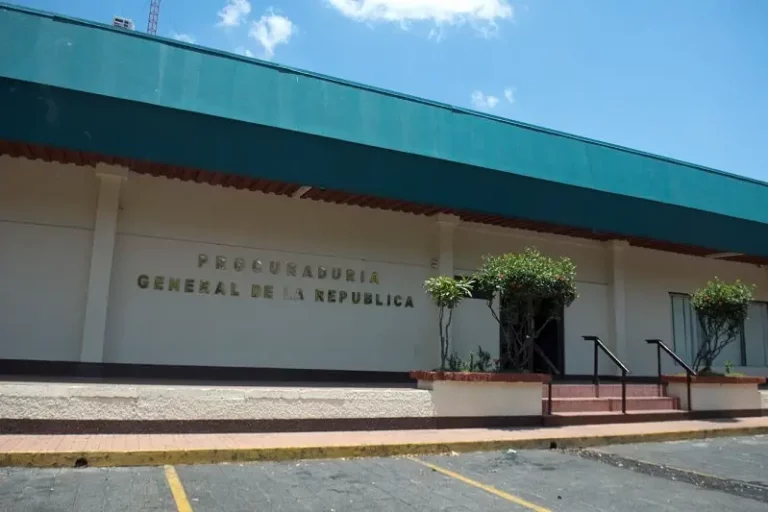11 de junio 2023

Children of Exile: The Births “Sowing Hope” in the Camp of Nicaraguan Farmers

PUBLICIDAD 1M
PUBLICIDAD 4D
PUBLICIDAD 5D
Ortega and Murillo violate the Constitution and international laws that guarantee the right to property

The Attorney General’s office is the body in charge of executing the confiscations for the dictatorship. Photo: Confidential | Archive.
The decision of the Ortega regime to illegally confiscate any assets and properties of the 222 political prisoners expelled from Nicaragua on February 9, 2023, is a legal barbarity that now affects 316 innocent citizens, and sends a new message insecurity for investors.
A sentence of May 19 and released this Friday, June 9, ordered the Attorney General’s Office (PGR) to proceed with the confiscation of the assets of the 222 exiles, almost following the same script used against the 94 Nicaraguans who were declared stateless on February 15.
“This robbery irreparably damages the entire Nicaraguan legal establishment in matters of private property. With the Ortega-Murillo family in power, no one in Nicaragua is safe. There is no Nicaraguan who can feel that his life, liberty, personal property, physical integrity or even his right to his own religion are protected,” said former presidential candidate Félix Maradiaga.
“Just as the Ortega regime has also expropriated assets that legitimately belong to the Catholic Church, the message it sends is that no Nicaraguan will be able to have peace of mind or guarantees of their assets,” he warned.
“What Ortega has just done is an unlawful barbarity that continues to increase the demolition of human rights, in this case the right to property, universally guaranteed by world human rights treaties and conventions,” said political analyst Jose Davila.
Ernesto Medina -one of the 94 stripped of his nationality and confiscated on February 15- said that “when laws are applied retroactively; and without any legal formality someone is sentenced, it means that the law of the jungle is being applied, the ‘every man for himself’. If the minimum standards for civilized coexistence are not respected, that is the law of the stick, which is inadmissible in the 21st century”.
The professor said that no serious investor can see conditions in Nicaragua to risk their money, because it is normal for them to look for the best conditions so that their money can be reproduced. “With this authoritarian drift of the Ortega Murillo’s, Nicaragua has become a paradise for illicit businesses; drug dealers, arms dealers, or predators who have no regard for people or the environment.”
“The image that is perceived when expropriating the 222 former prisoners of their property is of a repressive state that takes possession of other people’s property for political reasons and revenge against those who do not agree with their ideas,” said analyst Davila. “They take over the property of people who cannot defend themselves, since they are exiled and denationalized, totally defenseless. It is robbery plain and simple, which constitutes a crime,” he added.
“This theft is another serious violation of fundamental human rights, since private property is a constitutional right and a basic legal guarantee consigned in multiple international agreements signed by Nicaragua,” Maradiaga declared, detailing that it is the third time in his life that he suffers the confiscation of his assets by a government headed by Daniel Ortega.
The first of these was in the 1980s, when his family was the victim of the piñata, an experience that gave rise, from his childhood to “a feeling of greater commitment to justice and a determination against the Sandinista Front.” asserted.
The second was in 2018, when he was accused “arbitrarily”, which led to a process of confiscation of his property, including the fact that those of his personal or institutional bank accounts that were immobilized that year, were returned to him. In addition, “vehicles and valuable personal items had been stolen,” he recalled.
After this new confiscation (an illegality that had already affected his wife Berta Valle, included in the list of the 94), Maradiaga expresses his “outrage at this new theft of property” that his family has experienced “firsthand… in this third confiscation an even stronger commitment arise in me to dedicate my entire life to the search for justice for Nicaragua,” he promised.
Ernesto Medina commented on what it means for a society, that the Government strips citizens who think differently of their rights and assets, because such a decision not only affects the 316, but also their relatives, even if they have nothing to do with it.
“The consequences must be disastrous, because people end up getting used to it, and ask ‘why did they get involved in that? We better not get involved in anything,’ so the barbarity that we live in the country continues to be perpetuated.
“That a society begins to get used to such abuses, to keep quiet, or to fall into the servility of bowing its head and smiling at the rulers, is a sign that something is very wrong. Living under conditions of domination, threat, terror has very serious moral and subjective effects for a society”, he concluded.
This article was originally published in Spanish in Confidencial and translated by Havana Times

PUBLICIDAD 3M
Periodista nicaragüense, exiliado en Costa Rica. Durante más de veinte años se ha desempeñado en CONFIDENCIAL como periodista de Economía. Antes trabajó en el semanario La Crónica, el diario La Prensa y El Nuevo Diario. Además, ha publicado en el Diario de Hoy, de El Salvador. Ha ganado en dos ocasiones el Premio a la Excelencia en Periodismo Pedro Joaquín Chamorro Cardenal, en Nicaragua.
PUBLICIDAD 3D